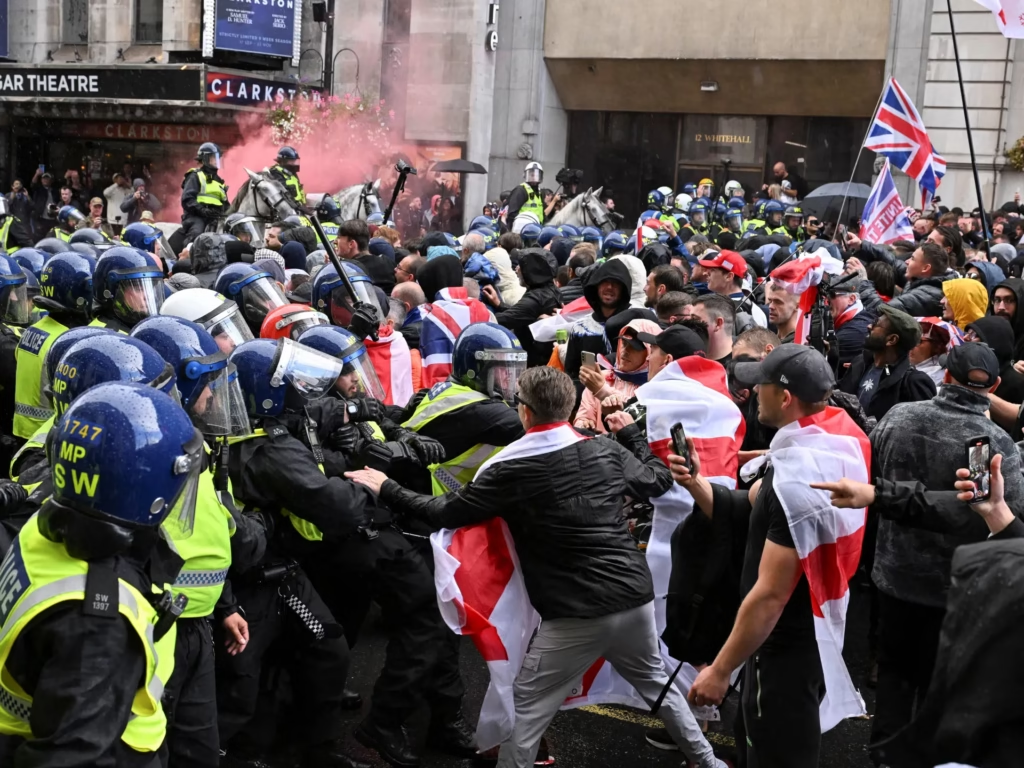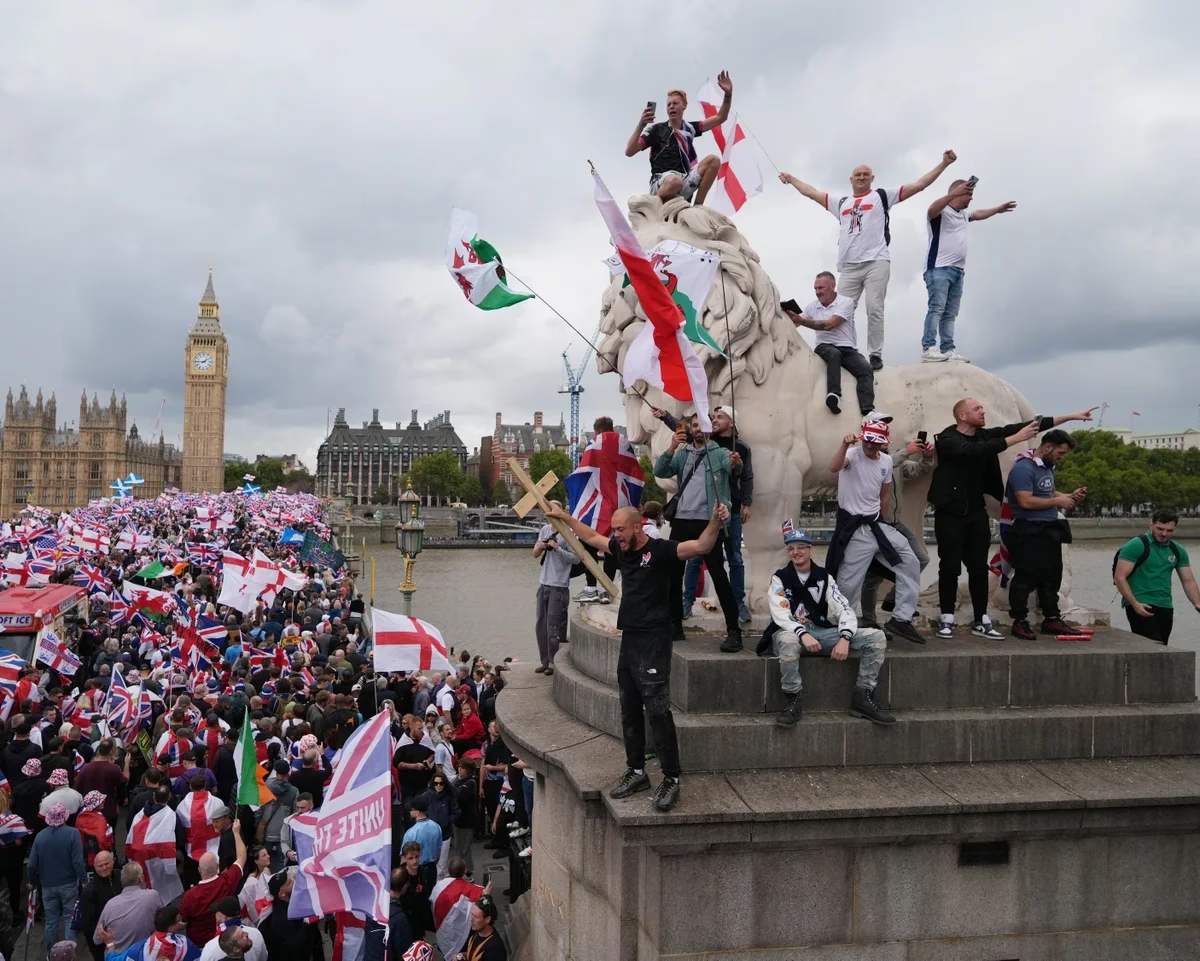
Hundreds of demonstrators gathered in central London this weekend, waving banners and chanting slogans at the highly charged Unite the Kingdom rally. The protest, which took place near Parliament Square, aimed to spotlight a growing and controversial message: “We are being colonised by our former colonies.” Organizers and participants claimed that the United Kingdom is undergoing a dramatic shift in its national identity, fueled by immigration from former colonies of the British Empire.
A Rally Fueled by Nationalism and Identity Concerns
The Unite the Kingdom rally drew nationalists, concerned citizens, and far-right political activists who argued that immigration from countries like India, Pakistan, Nigeria, and Bangladesh is rapidly changing the UK’s cultural fabric. Protesters held signs declaring, “Stop the Colonisation” and “Protect British Values”, while speakers addressed the crowd with passionate speeches about sovereignty and heritage.
John Hamilton, one of the event’s lead organizers, told the crowd, “We granted independence to our former colonies with the hope of self-governance. Instead, we now find our own nation being reshaped by their citizens.” His words resonated with supporters, while drawing sharp criticism from counter-protesters and human rights advocates.
Why the Movement Has Gained Momentum
The timing of the rally is not coincidental. In recent years, the UK has faced increasing political debates over immigration, economic pressures following Brexit, and a rise in nationalist sentiment. According to recent government data, a significant percentage of new immigrants to the UK hail from former colonies—countries once governed under British rule.
Many supporters of the movement argue that the government’s immigration policy lacks a long-term plan to maintain British identity. Sarah Whitmore, another speaker at the event, said, “We are watching our history, traditions, and way of life slowly erode under the weight of unchecked migration.”
On the other side, critics argue that such rhetoric dangerously misrepresents the complexity of modern British society. Dr. Helen Morrison, a sociology expert at the London School of Economics, stressed, “The narrative of ‘reverse colonisation’ is misleading. The UK has evolved into a multicultural society where diversity strengthens, rather than weakens, national identity.”
Government and Public Reaction
The UK government swiftly condemned the rally, emphasizing that immigration policies aim to balance economic needs and humanitarian responsibility. A Home Office spokesperson stated, “We stand for a fair and humane immigration system that serves both the interests of the nation and those of immigrants. Promoting division is unacceptable.”
Public reaction has been polarizing. On social media platforms, the rally sparked heated debates. Supporters used hashtags such as #UniteTheKingdom and #BritishIdentity to show solidarity, while critics pushed back with #DiversityIsStrength and #StopTheHate, calling the event xenophobic and regressive.
David Patel, a British citizen of Indian descent, shared his view on Twitter: “Our ancestors contributed to building modern Britain. Demonizing immigrants ignores our shared history and contribution.”
Meanwhile, protest counters gathered near the event, holding signs like “Refugees Welcome” and “No to Racism”, underscoring the divide within society.
Experts Warn of Growing Social Fractures
Experts warn that ignoring the underlying concerns about identity and integration could lead to increased societal tensions. Dr. Morrison highlighted the importance of open dialogue, saying, “Rather than scapegoating immigrants, we must address the structural challenges of integration, economic disparity, and representation.”
Political analysts believe that the Unite the Kingdom movement reflects a broader trend seen across Europe and North America—where nationalist movements are capitalizing on public unease about globalization, immigration, and cultural change.
Professor Mark Allen of King’s College London explained, “This is not an isolated phenomenon. Similar groups have emerged in Germany, France, and the United States. They thrive by framing immigration as an existential threat, which oversimplifies a complex issue.”
The Future of the Movement
Despite government condemnation and public outcry, the organizers of the Unite the Kingdom rally insist they will press forward. They plan to hold more demonstrations in key cities, launch a petition demanding stricter immigration policies, and seek parliamentary representation to amplify their message.
As John Hamilton concluded during the rally, “This is only the beginning. We will continue fighting to preserve what remains of our British heritage.”
However, the path ahead remains uncertain. Will this movement gain mainstream political traction, or will it remain a fringe element in Britain’s political landscape?
Conclusion
The Unite the Kingdom rally has thrust the debate over immigration, national identity, and sovereignty into the spotlight. While supporters claim they fight for the preservation of British values, critics argue the movement veers dangerously close to xenophobia. As the nation grapples with its post-Brexit identity, one thing is clear: discussions around immigration and cultural preservation will remain hotly contested topics for years to come.



